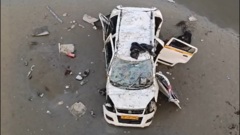The recent death of three men following a car crash in Uttar Pradesh highlights the potential implications of relying on digital navigation systems like Google Maps, raising discussions about the app's responsibility and India's road infrastructure.**
Tragic Accident in India Raises Questions on Google Maps Accountability**

Tragic Accident in India Raises Questions on Google Maps Accountability**
A fatal car crash has led to widespread debate over the reliability of navigation apps in India.**
A tragic car accident in northern India has reignited a heated debate over the reliability and responsibility of digital navigation applications like Google Maps. On Sunday, three men en route to a wedding lost their lives when their vehicle plunged off an unfinished bridge and onto the riverbed in Uttar Pradesh. As the investigation unfolds, authorities are scrutinizing whether Google Maps inadvertently directed the victims toward a route with known hazards.
Local reports suggest that the bridge had been partially collapsed due to flooding earlier this year, a detail well-known to residents but not to the out-of-town guests. Alarmingly, the bridge lacked adequate safety measures such as barricades or warning signs, potentially exacerbating the situation. In the aftermath, police have named four engineers from the state's road department and an unnamed Google Maps official in a complaint accusing them of culpable homicide.
In response, Google has stated that it is cooperating with the ongoing investigation. This incident raises critical questions about the responsibility of navigation apps when their users arrive at dangerous locations without adequate warning. Critics argue that Google Maps should provide real-time updates on road conditions, while others place the blame squarely on the inadequacies of government infrastructure. With around 60 million active users, Google Maps has become a staple for navigation in India, but its reliability has come into question, particularly after previous accidents linked to misguided directions.
In 2021, a Maharashtra resident drowned after following instructions from the app, and in another tragic case last year, two young doctors in Kerala drove into a river while using Google Maps. Indian law does not hold digital platforms like Google Maps accountable as their users are advised to use their judgment when navigating. However, legal experts suggest that if it can be proven that the app failed to update hazardous information despite being informed, the company may face negligence claims.
Google Maps does update its platform based on real-time GPS data from users, governmental notifications, and other inputs, but the vast and rapidly changing Indian road landscape complicates accurate communication of conditions. Experts in the mapping field highlight that unlike other nations with robust infrastructural reporting systems, India lacks a cohesive framework that allows for the timely logging of changes affecting road safety.
The tragic events underscore the need for improved infrastructure and real-time data sharing in India, as well as a reevaluation of our reliance on navigation applications. Until substantial changes are made, it seems that the challenges of accurate mapping and road safety will persist in the country.





















